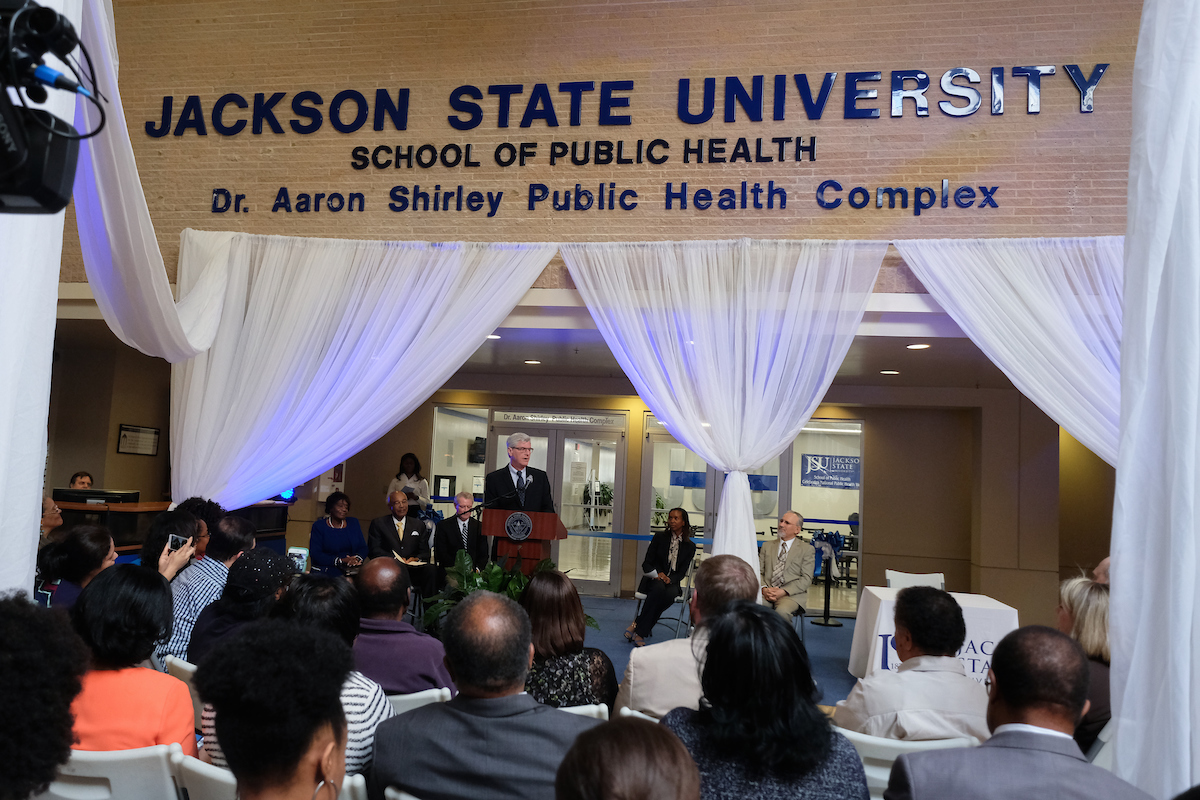
[hr]
![]()
[hr]
[hr]Gov. Phil Bryant and other advocates for better healthcare statewide lauded Mississippi’s only School of Public Health at Jackson State University during a ribbon-cutting ceremony Monday, April 3, in the Jackson Medical Mall for raising the prospects for lowering medical costs, fighting diseases and preventing early mortality.
Bryant, citing the push to expand Jackson’s medical corridor, told hundreds gathered that he highly supports “this great urban university” and views the location for the School of Public Health as “an area that must be wholly involved in public health.” Furthermore, he said, “We must take responsibility for our own healthcare in the beginning.”
He also praised the mission of JSU interim President Rod Paige for helping to improve the quality of life, and declared, too, that “you’ve got to love a president who wears cowboy boots.”
The governor, who grew up in Moorhead, Miss., remembered that during his youth the Delta had only one physician, who also made house calls. “I realized that doctor did something very special. He was not only delivering healthcare; he was delivering hope to people who were in a struggle to simply survive. Now, we’re doing the same thing in a larger sense through the School of Public Health – to better health, to better the education of health, to better the workforce and to better the quality of life for our citizens here in Mississippi.”
[pullquote align=”right”]”For too long our healthcare system’s focus has been on diagnosis and treatment rather than prevention. Empirical evidence dictates that we must make population-based disease prevention and health promotion the focus of our healthcare system.” — Dr. Mohammad Shahbazi, interim dean, JSU’s School of Public Health[/pullquote]Dr. Mohammad Shahbazi, interim dean of JSU’s School of Public Health, said he’s optimistic that the entire state’s population will reap benefits.
Shahbazi said that public health practices have added 25 years to the life expectancy of people in the U.S. over the past 100 years. As well, he said those actions “keep our food and water supply safe, prevent the outbreak of infectious diseases, impact policymaking, remove disparities and provide access to healthcare.”
Despite such significant accomplishments, however, he said the nation still spends more money on healthcare annually than other developed countries yet improving health, especially in Mississippi, has been a challenge. “One reason is that for too long our healthcare system’s focus has been on diagnosis and treatment rather than prevention. Empirical evidence dictates that we must make population-based disease prevention and health promotion the focus of our healthcare system.”
State Rep. Angela Cockerham, who was pivotal in helping JSU secure funding, acknowledged the importance of the new school and commended Bryant’s effort, telling the governor “the School of Public Health will always have your footprint. It is a testament and embodiment of your mission for a healthier Mississippi. I pray that this School of Public Health will live out your mission of working with others across this state and around the world to ensure that all have access to public health.”
Dr. Glenn Boyce, commissioner of Mississippi Institutions of Higher Learning, expressed gratitude to the governor and JSU alum Cockerham for championing healthcare in Mississippi. Boyce hailed the JSU School of Public Health because “we understand that the healthier you are the more productive you’re going to be. … This is a noble pursuit to help people live better lives. All the Jackson State University students – who are going to sit in classrooms with faculty who are absolutely some of the best leaders in the field – are going to be trained by the best in the field. Twenty years from now, what those students are going to do for the state of Mississippi will be absolutely phenomenal.”
Capping off the ceremony, Bryant delivered a proclamation recognizing National Public Health Week. “We cannot take for granted the responsibility that we have to work hard to exercise, to eat properly, to not abuse our bodies. We thank the good Lord for the health that he has provided to us and to those who can provide healthcare to others.”






